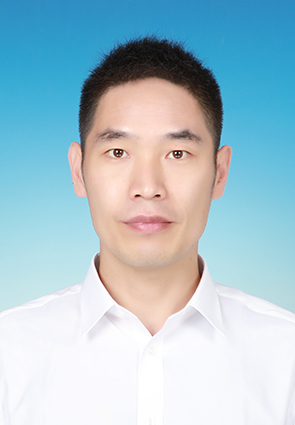 |
Zhao Shaowei |
|
Gender: male Department: Genetics and Cell Biology Tel: Office Location: Shengwulou 123, College of Life Sciences, Nankai University Career: Professor Major: Genetics Email: swzhao@nankai.edu.cn Address: Shengwulou 123, College of Life Sciences, Nankai University, Weijin Road 94, Tianjin 300071 |
ResumeShaowei Zhao, Professor, earned the PhD degree from IGDB, CAS in 2012, completed postdoctoral training at UMass Medical School in the USA from 2013 to 2019, and then worked at Nankai University since October 2019. Achievements as PI of an independent laboratory: 1) discovered that oncogenic Ras mutations trigger polyploid cell death through inducing aberrant division stress; 2) identified a novel intrinsic mechanism that counteracts oncogenic Ras stimuli; 3) provided the first evidence that tumors can functionally mimic the stem cell niche to inhibit the differentiation of neighboring wild-type stem cells. These findings were published as the sole or last corresponding author in leading journals, including eLife (2), Stem Cell Reports, Genetics, and Developmental Biology.
Education09/2005 - 01/2012: Institute of Genetics and Developmental Biology, Chinese Academy of Sciences, PhD majored in Developmental Biology; 09/2001 - 07/2005: Shandong Normal University, China, Bachelor majored in Bioscience.
WorkExperience10/2019 - present: Principal Investigator at Department of Genetics and Cell Biology, College of Life Sciences, Nankai University; 07/2013 - 09/2019: Postdoc in Eric H. Baehrecke's laboratory at the University of Massachusetts Medical School, USA.
Research FieldsOur laboratory investigates oncology and stem cell biology using Drosophila and mice as model systems. Currently, we are focusing on two main research directions: 1. Intrinsic mechanisms that counteract oncogenic Ras stimuli Approximately 20-30% of human cancers stem from mutations in the Ras family genes, and the Ras pathway is the most frequently altered oncogenic pathway in cancer. Despite this prevalence, designing drugs that specifically target Ras oncoproteins remains highly challenging due to the structural characteristics of Ras small GTPases. Moreover, the Ras family genes exhibit high conservation from Drosophila to humans. Our recent work revealed that oncogenic Ras can induce aberrant division stress, leading to the death of polyploid Drosophila ovarian nurse cells (Stem Cell Reports, 2024). Leveraging this model system, we uncovered a novel intrinsic mechanism that counteracts oncogenic Ras stimuli in both polyploid and diploid tumor cells, including human tumor cells (eLife, 2025(a)). Building on these findings, we will further dissect the intrinsic mechanisms that counteract oncogenic Ras stimuli and explore their therapeutic potential for Ras-driven human cancers. 2. Interactions between tumors and neighboring normal stem cells Tumorous tissues in cancer patients contain both tumors and normal cells. While previous research has largely concentrated on tumor cell initiation, proliferation, and eradication, there is limited understanding of how tumors interact with normal cells. Nonetheless, normal cells, particularly normal stem cells, hold significant promise for patient outcomes. Therefore, elucidating the interactions between tumors and adjacent normal stem cells is crucial. During his postdoctoral research, our laboratory's PI discovered that autophagy enhances the competitive advantage of tumor-like over normal stem cells, thereby promoting invasive tumor growth in organs (Current Biology, 2018). Subsequent studies from our lab have revealed that this competitive advantage of tumor-like stem cells is predominantly driven by their enhanced division ability (Genetics, 2023). We have also elucidated the regulatory network controlling this division ability through recent investigations (Developmental Biology, 2024). Additionally, we provided the first evidence that stem cells can functionally mimic the stem cell niche to inhibit the differentiation of neighboring wild-type stem cells (eLife, 2025(b)). Our laboratory is performing further studies to explore this direction. AchievementSelected Publications (as the sole/last corresponding author or sole first author): (1) Yang Zhang, Yuejia Wang, Jinqiao Song, Lizhong Yan, Ziguang Wang, Dongze Song, Yudi Zhao, and Shaowei Zhao*. Tumors mimic the niche to inhibit neighboring stem cell differentiation. eLife (preprint), 2025 (b). (sole corresponding author) (2) Qi Zhang#, Yunfeng Wang#, Xueli Fu#, Ziguang Wang, Yang Zhang, Lizhong Yan, Yuejia Wang, Muhan Yang, Dongze Song, Ruixing Zhang, Hongru Zhang*, Shian Wu*, and Shaowei Zhao*. Uev1A counteracts oncogenic Ras stimuli in both polyploid and diploid cells. eLife (preprint: https://elifesciences.org/reviewed-preprints/107104), 2025(a). (last corresponding author) (3) Qi Zhang, Yanfang Wang, Zhenan Bu, Yang Zhang, Qian Zhang, Le Li, Lizhong Yan, Yuejia Wang, and Shaowei Zhao*. Ras promotes germline stem cell division in Drosophila ovaries. Stem Cell Reports 19, 1205–1216, 2024. (sole corresponding author) (4) Qian Zhang, Le Li, Qi Zhang, Yang Zhang, Lizhong Yan, Yanfang Wang, Yuejia Wang, and Shaowei Zhao*. Genetic circuitry controlling Drosophila female germline overgrowth. Developmental Biology 515, 160–168, 2024. (sole corresponding author) (5) Qian Zhang#, Yang Zhang#, Qi Zhang, Le Li, Shaowei Zhao*. Division promotes adult stem cells to perform active niche competition. Genetics 224(1), iyad035, 2023. (sole corresponding author) (6) Shaowei Zhao, Tina M. Fortier, and Eric H. Baehrecke*. Autophagy Promotes Tumor-like Stem Cell Niche Occupancy. Current Biology 28, 3056–3064, 2018. (sole first author) Social AppointmentsTeaching ExperienceHonor Title |
|
|
|
10 Access |